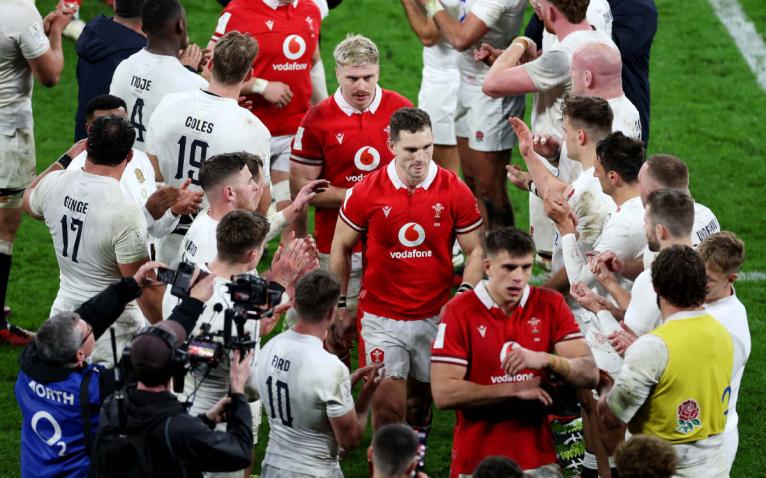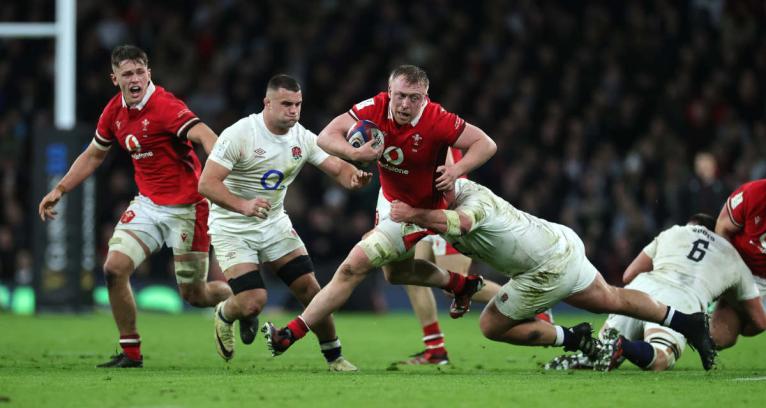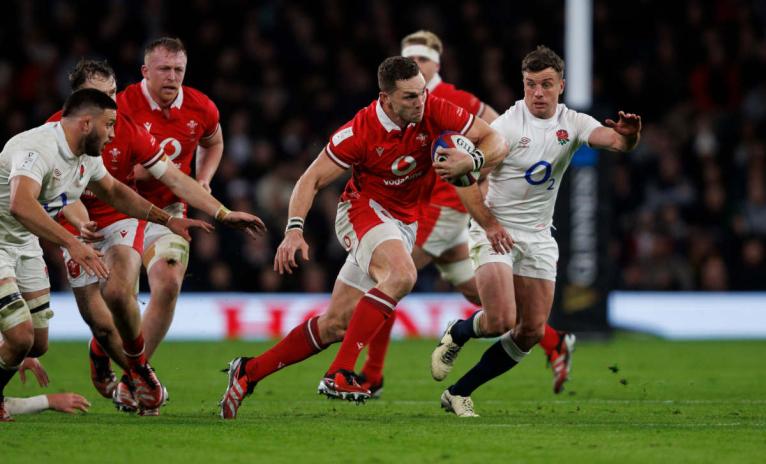When Wales travelled to Twickenham, no one really knew what to expect from this callow team. Had the second-half comeback against Scotland been an apparition, a mirage, or simply proof that Scotland 27-0 up, had become complacent. Or had Warren Gatland happened on the makings of a side who could go toe-to-toe with the Northern Hemisphere’s most gnarled operators.
Afterward 80 minutes of an absorbing battle, Gatland’s language would point to the latter as Wales seriously threatened a first Six Nations win at Twickenham in 12 years, relinquishing the lead in the 71st minute to see the ledger swing in England’s favour, 16-14.
Despite bemoaning a second narrow loss, and some Welsh naivity, his overriding emotion was pride that his young players had given England a genuine fright, leading for 55 minutes of the contest. “I said to the players in the changing room that we have to be disappointed with that. We put ourselves in a position where we should have won that game but I think they’re going to be a bloody good team going forward.”
Gatland name checked a clutch of players in the post-match pleasantries. Alex Mann further bolstered his burgeoning reputation with a second try in two games. “He’s not the biggest in the world but he reminds me of a New Zealand loose forward.” Meanwhile Tommy Reffell was lauded for his all-action display. “I’m absolutely delighted for Tommy because he’s starting to get a nice balance in his game that can take him to the next level. I thought he was outstanding.”

Aaron Wainwright, now one of Wales’ senior players, was also impressive and his form should see him in the conversation for Andy Farrell’s British & Irish Lions tour in 16 months.
The early portents hadn’t been promising, however. In the first 10 minutes, Wales didn’t put a foot in England’s half, as Jamie George’s men dominated, with Freddie Steward – marshalling the skies all afternoon – scything through the Welsh defence far too easily. A score was a matter of when, not if, as Swing Low started rumbling from the 82,000 assembled masses, and yet a smart turnover from Reffell, five metres out, relieved the pressure and gave Wales breathing space. Slowly they started to settle.
With England unable to find their fluency and lacking clinical edge to turn possession and territory into points, Wales grew into the game and with one of their rare forays into England’s half, through a pinpoint penalty kick from Ioan Lloyd, found decent field position. With Wainwright taking clean ball off the top, Wales formed a driving maul and rumbled onwards towards England’s tryline and were hauled down by a desperate Ethan Roots. Referee James Doleman pointed to the posts to award a penalty try and Roots was marched to the sidelines for 10 minutes, to sit alongside Ollie Chessum who had been yellow carded for a high tackle on Kieron Assirati.
Wales built up a head of steam in England’s half, going through 25 phases, yet they couldn’t break the Felix-Jones inspired defensive resolve that ploughed into Welsh attackers with venom and Sam Underhill rearranged Gareth Thomas’ ribs after a hospital pass from Lloyd.
With Wales 7-0 up, and England down to 13-men, Gatland’s men showed their naivity, and lack of game management. With Wales under pressure on their own line, Lloyd looked to play, when he should have been clearing his lines, and was clattered by Maro Itoje. From the resulting scrum, Ben Earl, powered from the base and Mann and the lightweight youngsters Lloyd and Winnett failed to stop the No 8 from crossing. It felt like an act of self-harm from Wales, with the clear numerical advantage. Even though conversion was missed – Ford was adjudged to have moved as the Welsh players rushed up and stopped him taking the kick, leaving the 92-cap fly-half turning crimson. He later disagreed that he should have been penalised, yet discussion will continue to split opinion after the heroics of Cheslin Kolbe against France after some procrastination from Thomas Ramos.
Wales were more than holding their own and built up a head of steam in England half, going through 25 phases, yet they couldn’t break the Felix-Jones inspired defensive resolve that ploughed into Welsh attackers with venom and Sam Underhill rearranged Gareth Thomas’ ribs after a hospital pass from Lloyd. Momentum painfully ended.

Yet Wales weren’t deterred. Instead, it inspired them. On the cusp of half-time, a break from the outstanding Reffell, saw Wales threaten deep into the England half. From the resulting breakdown, Tomos Williams passed the ball to Thomas who put a cute inside ball back to Williams and he drew Steward to put Alex Mann away, with Aberdare’s finest in dreamland. It was a brilliantly worked try that showcased Wales’ guile as a counter point to England’s lack of cutting edge.
At the break, Wales were nine points to the good and sensing a first victory since 2012 in the Six Nations and a lack of accuracy saw Wales continue to grow in confidence as the game progressed, with muscular carries from George North and a quick fire linebreak from Cameron Winnett – in only his 17th professional game – seeing Rio Dyer going within metres of crossing the England try-line before spilling the ball from Josh Adams.
England, to their credit, weren’t done and hit back after a series of phases underneath the Welsh posts when they decided to go wide and a diving fingertip pass from Elliot Daly to Fraser Dingwall saw the Saints centre going over in the corner. Ford missed the touchline conversion to leave them within a point.
George Ford scanned ahead of him, protected by England’s forwards, evaded the onrushing Reffell and fizzed a sumptuous 50-22 to box Wales in the half and keep up the pressure on Wales’ creaking lineout. It was the game’s defining moment.
The game’s defining moments took place in final 11 minutes. England were in the ascendancy, and leading on the scoreboard, after a penalty from Ford put them two points out in front but Wales were proving an obdurate opponent, stealing a turnover with England camped inside their 22. With both sides desperately trying to avoid making mistakes in the 69th minute, George Ford scanned ahead of him, protected by England’s forwards, evaded the onrushing Reffell and fizzed a sumptuous 53m 50-22 to box Wales in the half and keep up the pressure on Wales’ creaking lineout. It was the game’s defining moment.
From the resulting play, England sought and opening and Mason Grady stuck out a hand and slapped down the ball from Ford to Steward, he was sent the bin after being adjudged to willingly knocked a ball on.

Down to 14-men Wales sought to clear their lines, and get out of their half but England were able to stymie any Welsh resistance as the clock wound. Wales struggled to get round the edge of England aggressive defence. A last-gasp speculative cross-kick from Lloyd with seconds to go, saw Dyer being clumsily taken out by Ford, but no penalty was given and a secure lineout saw Care – who was given a rapturous reception when he entered the fray – to dink the ball into touch, and leave the Twickenham faithful, while not in raptures, content at a spirited second-half comeback. As Borthwick said afterwards, as he had said consistently through the World Cup, ‘they found a way’.
The tale of the tape showed that Wales gave away fewer penalties, had more possession, carried more and made more metres than England, yet still lost by the narrowest of margins.
Gatland, with four Six Nations tournament wins and three Grand Slams, has earnt some more runway than most coaches, and despite only one win in seven since returning, he is urging Welsh supporters to consider how early this team is in its evolution, before passing judgement.
Gatland, with four Six Nations tournament wins and three Grand Slams, has earnt some more runway than most coaches, and despite only one win in seven since returning, he is urging Welsh supporters to consider how early this team is in its evolution, before passing judgement. “My message for the Welsh public is to have a bit of patience. Hopefully people on the outside can see what we’re trying to do as a squad.”
That patience will surely be required in abundance with Wales travelling to Ireland in two weeks looking for a first Six Nations win in Dublin for 12 years. They will face an Andy Farrell-inspired side who have won 18 of their last 19 fixtures and are bearing down on a Grand Slam. With two promising outings, Gatland will hope his latest project isn’t derailed by the fervour and brilliance of the Irish machine, because right now, a Wooden Spooner decider against Italy in Cardiff looks the most likely outcome.
There is clearly room for growth in this young Welsh side, it just depends whether it is enough to see Gatland’s men dining at the top table of the Six Nations rather than also-rans. Time will tell.


Comments
Join free and tell us what you really think!
Sign up for free